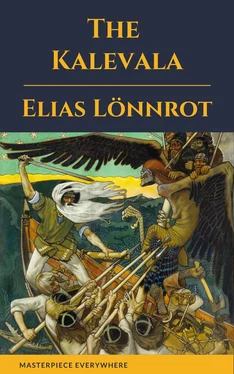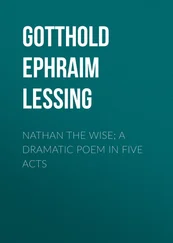1 ...7 8 9 11 12 13 ...24 There she made a hole for fishes;
Where she dived beneath the waters,
Fell the many deeps of ocean;
Where upon her side she turned her,
There the level banks have risen;
Where her head was pointed landward,
There appeared wide bays and inlets;
When from shore she swam a distance,
And upon her back she rested,
There the rocks she made and fashioned,
And the hidden reefs created,
Where the ships are wrecked so often,
Where so many lives have perished.
Thus created were the islands,
Rocks were fastened in the ocean,
Pillars of the sky were planted,
Fields and forests were created,
Checkered stones of many colors,
Gleaming in the silver sunlight,
All the rocks stood well established;
But the singer, Wainamoinen,
Had not yet beheld the sunshine,
Had not seen the golden moonlight,
Still remaining undelivered.
Wainamoinen, old and trusty,
Lingering within his dungeon
Thirty summers altogether,
And of winters, also thirty,
Peaceful on the waste of waters,
On the broad-sea's yielding bosom,
Well reflected, long considered,
How unborn to live and flourish
In the spaces wrapped in darkness,
In uncomfortable limits,
Where he had not seen the moonlight,
Had not seen the silver sunshine.
Thereupon these words be uttered,
Let himself be heard in this wise:
"Take, O Moon, I pray thee, take me,
Take me, thou, O Sun above me,
Take me, thou O Bear of heaven,
From this dark and dreary prison,
From these unbefitting portals,
From this narrow place of resting,
From this dark and gloomy dwelling,
Hence to wander from the ocean,
Hence to walk upon the islands,
On the dry land walk and wander,
Like an ancient hero wander,
Walk in open air and breathe it,
Thus to see the moon at evening,
Thus to see the silver sunlight,
Thus to see the Bear in heaven,
That the stars I may consider."
Since the Moon refused to free him,
And the Sun would not deliver,
Nor the Great Bear give assistance,
His existence growing weary,
And his life but an annoyance,
Bursts he then the outer portals
Of his dark and dismal fortress;
With his strong, but unnamed finger,
Opens he the lock resisting;
With the toes upon his left foot,
With the fingers of his right hand,
Creeps he through the yielding portals
To the threshold of his dwelling;
On his knees across the threshold,
Throws himself head foremost, forward
Plunges into deeps of ocean,
Plunges hither, plunges thither,
Turning with his hands the water;
Swims he northward, swims he southward,
Swims he eastward, swims he westward,
Studying his new surroundings.
Thus our hero reached the water,
Rested five years in the ocean,
Six long years, and even seven years,
Till the autumn of the eighth year,
When at last he leaves the waters,
Stops upon a promontory,
On a coast bereft of verdure;
On his knees he leaves the ocean,
On the land he plants his right foot,
On the solid ground his left foot,
Quickly turns his hands about him,
Stands erect to see the sunshine,
Stands to see the golden moonlight,
That he may behold the Great Bear,
That he may the stars consider.
Thus our hero, Wainamoinen,
Thus the wonderful enchanter
Was delivered from his mother,
Ilmatar, the Ether's daughter.
Rune II. Wainamoinen's Sowing.
THEN arose old Wainamoinen,
With his feet upon the island,
On the island washed by ocean,
Broad expanse devoid of verdure;
There remained he many summers,
There he lived as many winters,
On the island vast and vacant,
Well considered, long reflected,
Who for him should sow the island,
Who for him the seeds should scatter;
Thought at last of Pellerwoinen,
First-born of the plains and prairies,
When a slender boy, called Sampsa,
Who should sow the vacant island,
Who the forest seeds should scatter.
Pellerwoinen, thus consenting,
Sows with diligence the island,
Seeds upon the lands he scatters,
Seeds in every swamp and lowland,
Forest seeds upon the loose earth,
On the firm soil sows the acorns,
Fir-trees sows he on the mountains,
Pine-trees also on the hill-tops,
Many shrubs in every valley,
Birches sows he in the marshes,
In the loose soil sows the alders,
In the lowlands sows the lindens,
In the moist earth sows the willow,
Mountain-ash in virgin places,
On the banks of streams the hawthorn,
Junipers in hilly regions;
This the work of Pellerwoinen,
Slender Sampsa, in his childhood.
Soon the fertile seeds were sprouting,
Soon the forest trees were growing,
Soon appeared the tops of fir-trees,
And the pines were far outspreading;
Birches rose from all the marshes,
In the loose soil grew the alders,
In the mellow soil the lindens;
Junipers were also growing,
Junipers with clustered berries,
Berries on the hawthorn branches.
Now the hero, Wainamoinen,
Stands aloft to look about him,
How the Sampsa-seeds are growing,
How the crop of Pellerwoinen;
Sees the young trees thickly spreading,
Sees the forest rise in beauty;
But the oak-tree has not sprouted,
Tree of heaven is not growing,
Still within the acorn sleeping,
Its own happiness enjoying.
Then he waited three nights longer,
And as many days he waited,
Waited till a week had vanished,
Then again the work examined;
But the oak-tree was not growing,
Had not left her acorn-dwelling.
Wainamoinen, ancient hero,
Spies four maidens in the distance,
Water-brides, he spies a fifth-one,
On the soft and sandy sea-shore,
In the dewy grass and flowers,
On a point extending seaward,
Near the forests of the island.
Some were mowing, some were raking,
Raking what was mown together,
In a windrow on the meadow.
From the ocean rose a giant,
Mighty Tursas, tall and hardy,
Pressed compactly all the grasses,
That the maidens had been raking,
When a fire within them kindles,
And the flames shot up to heaven,
Till the windrows burned to ashes,
Only ashes now remaining
Of the grasses raked together.
In the ashes of the windrows,
Tender leaves the giant places,
In the leaves he plants an acorn,
From the acorn, quickly sprouting,
Grows the oak-tree, tall and stately,
From the ground enriched by ashes,
Newly raked by water-maidens;
Spread the oak-tree's many branches,
Rounds itself a broad corona,
Raises it above the storm-clouds;
Far it stretches out its branches,
Stops the white-clouds in their courses,
With its branches hides the sunlight,
With its many leaves, the moonbeams,
And the starlight dies in heaven.
Wainamoinen, old and trusty,
Thought awhile, and well considered,
How to kill the mighty oak-tree,
First created for his pleasure,
How to fell the tree majestic,
How to lop its hundred branches.
Sad the lives of man and hero,
Sad the homes of ocean-dwellers,
If the sun shines not upon them,
If the moonlight does not cheer them
Is there not some mighty hero,
Was there never born a giant,
That can fell the mighty oak-tree,
That can lop its hundred branches?
Wainamoinen, deeply thinking,
Spake these words soliloquizing:
Читать дальше












